Featured
 What Was Clarence Thomas Thinking? The Most Baffling Argument a Supreme Court Justice Has Ever Made. By Adam Serwer / The Atlantic
What Was Clarence Thomas Thinking? The Most Baffling Argument a Supreme Court Justice Has Ever Made. By Adam Serwer / The Atlantic
An opinion from Justice Clarence Thomas exposed the limits of originalism.
Midway through his concurrence with the Supreme Court’s decision to strike down affirmative action, Justice Clarence Thomas deploys one of the most absurd and baffling arguments ever put to paper by a justice.
In order to argue that the Framers of the Fourteenth Amendment did not intend to authorize racially specific efforts to alleviate inequality, Thomas finds himself forced to explain the existence of the Freedmen’s Bureau, which was reauthorized in 1866 by the same Congress that approved the Fourteenth Amendment. To square this circle, Thomas insists that the term freedmen was a “formally race-neutral category” and a “decidedly underinclusive proxy for race.” Read more
Related: No One Can Stop Talking About Justice John Marshall Harlan. By Jamelle Bouie / NYT
Political / Social
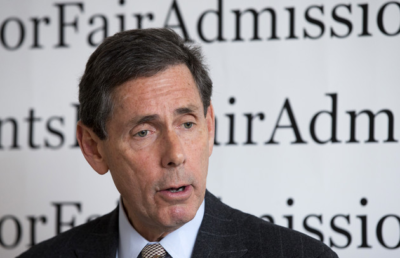 He Worked for Years to Overturn Affirmative Action and Finally Won. He’s Not Done. By Lulu Garcia-Navarro / NYT
He Worked for Years to Overturn Affirmative Action and Finally Won. He’s Not Done. By Lulu Garcia-Navarro / NYT
Edward Blum’s latest victory at the Supreme Court is the culmination of a long fight to take race out of college admissions. Is the workplace next?
Edward Blum has been working toward the end of race-based admissions in higher education for years. He first brought the issue of affirmative action before the Supreme Court in 2012, with Fisher v. University of Texas — a case he ended up losing. Since then, the 71-year-old legal activist has founded a group called Students for Fair Admissions, which just won at the Supreme Court against Harvard and the University of North Carolina, in a decision that effectively ended race-based affirmative action policies in American college admissions. Read more
Related: Asian American Conservatives Have Become Key Allies of White Supremacy. By Promise Li / The Nation
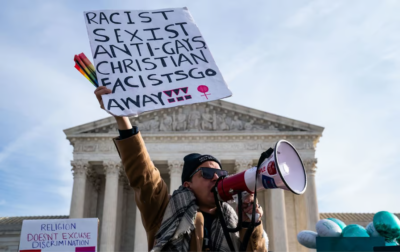 The Supreme Court Has Kicked the Door Wide Open to Jim Crow–Style Bigotry. By Elie Mystal / The Nation
The Supreme Court Has Kicked the Door Wide Open to Jim Crow–Style Bigotry. By Elie Mystal / The Nation
The court’s conservatives used a case literally based on a homophobe’s fantasies to blow a huge hole in our antidiscrimination laws and revive the spirit of Plessy v. Ferguson.
The conservative cultural movement is based on lies, misinformation, and fantasies. That’s what makes these people so odious when they crawl out from under their rocks and present themselves in the public square: They make stuff up and then demand that their delusions be given pride of place in our objective reality. The latest example of the danger of a conservative court untethered from facts came on Friday, the last day of the Supreme Court’s current term, in a case called 303 Creative v. Elenis. I’d like to tell you about the “facts” of this case, but there basically are none. Instead, 303 Creative is predicated on a fairy tale. Read more
Related: The Supreme Court’s new “separate but equal” doctrine. By Sabrina Haake / Salon
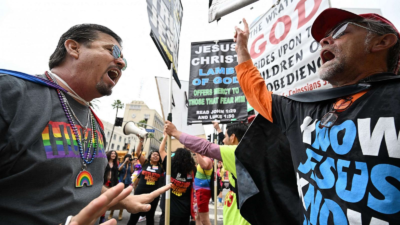 Culture wars: How identity became the center of politics in America. By Kiara Alfonseca / ABC News
Culture wars: How identity became the center of politics in America. By Kiara Alfonseca / ABC News
Across the political spectrum, Americans fight to define national culture.
Identity – including race, sexual orientation, gender – have become lightning rod subjects of hundreds of bills in state legislatures across the country as Americans across the political spectrum seek to define the nation’s values. Debate over these issues is intensifying as candidates gear up for the 2024 presidential cycle – but how did identity openly become one of the leading narratives for conservative politicians on the campaign trail? Read more
 Campus Diversity Will Be a Struggle Without Race-Based Admissions, History Shows. By Elaine S. Povich / Yahoo News
Campus Diversity Will Be a Struggle Without Race-Based Admissions, History Shows. By Elaine S. Povich / Yahoo News
States that have tried to enroll more Black and Hispanic students in state universities without using race-based admissions policies have seen the numbers of those students slip — especially at elite institutions.
Nine states had affirmative action bans before last week’s U.S. Supreme Court ruling striking it down nationwide. Those states and others have tried various strategies to maintain diversity without using race-based admissions. They include costly recruitment drives, guaranteed admission to high-ranking high school students and the elimination of preferences for relatives of alumni. Read more
Related: After the Affirmative Action Ruling, Asian Americans Ask What Happens Next.
Related: How Does Diversity Actually Work at College? We Asked 10 Young Black Americans. By NYT
Related: After Supreme Court affirmative action ruling, scholarships targeted. By Alia Wong / USA Today
 Harvard and other ‘Ivy Plus’ colleges are failing low-income students, Goldman Sachs says—but underfunded HBCUs don’t. By Paolo Confino / Fortune and Yahoo News
Harvard and other ‘Ivy Plus’ colleges are failing low-income students, Goldman Sachs says—but underfunded HBCUs don’t. By Paolo Confino / Fortune and Yahoo News
Harvard itself became a sort of case study—or pariah, depending on who you ask—for the inequalities of American education. In recent weeks, Harvard has been hit with a lawsuit and a state-wide bill in Massachusetts, both aimed at curbing the school’s legacy admissions.
The lawsuit, court ruling, and general condemnation all raise bigger questions about the direction of American education. Can it live up to its stated goals as a critical stepping stone toward achieving the American Dream? Or does it now perpetuate inequality by trapping middle- and lower-class students into never-ending cycles of student debt that wealthy students can either pay off with ease or never accrue to begin with? A comprehensive report by Goldman Sachs found one type of college more than any other lives up to the promise of social mobility: historically Black colleges and universities. Read more
Related: Harvard hit with legacy admissions tax proposal. By Janet T. Lorin and Bloomberg / Fortune
 14 promises Donald Trump has made in his campaign for a second term. By Abby Turner / CNN
14 promises Donald Trump has made in his campaign for a second term. By Abby Turner / CNN
Former President Donald Trump has hit the 2024 campaign trail and is giving voters a preview of what a second Trump presidency could look like if he’s elected. He’s made many campaign promises – many of which are often vague and lacking in details or specifics – including ending the war in Ukraine, building 10 new cities and giving drug smugglers the death penalty. Here are some of the policies he says he would enact if elected for a second term. Read more
Related: Ron DeSantis Is Running One Freaky Campaign. By Frank Bruni / NYT
 Exonerated member of ‘Central Park Five’ wins primary for NYC Council seat. By Bobby Caina Calvan / AP and ABC News
Exonerated member of ‘Central Park Five’ wins primary for NYC Council seat. By Bobby Caina Calvan / AP and ABC News
Some consider Yusef Salaam a folk hero as a member of the “Central Park Five,” the group of teenagers wrongly convicted of raping a white jogger in a brutal attack 34 years ago. Now he’s banking on his painful past to help win a seat on the New York City Council. (June 22) (AP Video/Robert Bumsted)
Yusef Salaam, one of the exonerated “Central Park Five,” has won a Democratic primary for a seat on the New York City Council, all but assuring him of eventual victory. It’s an improbable feat for a political novice who was wrongly accused, convicted and imprisoned as a teenager for the rape and beating of a white jogger in Central Park. The Associated Press refrained from calling the race on election night, but vote tallies released Wednesday showed him to be the clear winner to represent Central Harlem. Salaam is not expected to face a serious challenge in November’s general election, if any. It is time, he said, for “a new Harlem renaissance.” Read more
 If we avoid a recession, we can thank Black and Hispanic workers. By Heather Long / Wash Post
If we avoid a recession, we can thank Black and Hispanic workers. By Heather Long / Wash Post
The U.S. labor market is on a gravity-defying streak. The June jobs report was a tad softer than expected, but the overall trend is so strong that recession fears are fading. Hiring remains solid across many industries, including construction, and companies are largely holding on to their workers.
There’s growing optimism that the country can avoid a downturn. One key reason this is possible is the surge of new workers. Nearly 4 million more people are employed now than just before the pandemic hit. That’s more families with steady incomes to spend, which helps explain the vigorous sales of everything from cars to gardening supplies. There has also been a big upshift in the labor force since the pandemic: Low-paying hospitality employment still hasn’t recovered, as workers have traded up to higher-paying business, health-care and warehouse work. Fewer White people are employed now than pre-pandemic. In contrast, over 2 million more Hispanics are employed now, over 800,000 more Asian Americans and over 750,000 more African Americans. Read more
Ethics / Morality / Religion
 Reparations campaign takes new forms with Bible study, Juneteenth march. By Adelle M. Banks / RNS
Reparations campaign takes new forms with Bible study, Juneteenth march. By Adelle M. Banks / RNS
The case for restitution and restoration is laid out across the Old Testament and New Testament,’ reads the introduction of the National Council of Churches’ study.
Last month, nearly 30 faith and human rights groups, including the Presbyterian Church USA, the Union for Reform Judaism and the United Church of Christ’s social justice ministry, sent a letter to President Biden seeking an executive order to move the debate along. The National Council of Churches, which recently spearheaded a letter to President Joe Biden, is trying a new tactic: a six-week Bible study. Read more
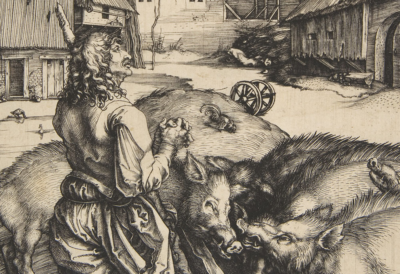 What can Renaissance art and Howard Thurman tell us about the prodigal son? By David B. Gowler / NCR
What can Renaissance art and Howard Thurman tell us about the prodigal son? By David B. Gowler / NCR
Detail from “The Prodigal Son Among the Pigs” (1496) by Albrecht Dürer (Metropolitan Museum of Art)
In this striking piece, the urgency of the pigs’ scramble for food matches the urgency of the prodigal’s physical and spiritual hunger. The viewer’s gaze is immediately drawn to the prodigal, who kneels on one knee with clasped hands and eyes raised to heaven. Insights about the parable from the great theologian Howard Thurman can enhance our appreciation of Dürer’s image and the spiritual journey it can evoke. Like the engraving, Thurman believes that the famine in the land reflects not only the prodigal’s physical hunger but his internal spiritual famine: “The famine that the boy experienced in the far country, he was already experiencing in his own heart. It’s very simple.” Read more
 She Broke the News That the U.S. Catholic Church Sold Enslaved People. She’s Still Going to Mass. By Jesse Naranjo / Politico
She Broke the News That the U.S. Catholic Church Sold Enslaved People. She’s Still Going to Mass. By Jesse Naranjo / Politico
When Rachel Swarns first learned of the sale, she was “flabbergasted.”
Swarns, who first broke the news about Georgetown’s past in 2016, recounts the story of the people enslaved on the St. Inigoes plantation in southern Maryland in her new book, The 272: The Families Who Were Enslaved and Sold to Build the American Catholic Church. The book focuses on the lives of the Mahoneys, one of many families enslaved and sold by the Jesuit priests. Read more
 Religious right gets blindsided by angry parents in a Southern California school district. By Blake Jones / Politico
Religious right gets blindsided by angry parents in a Southern California school district. By Blake Jones / Politico
Three Southern California school board members backed by a far-right pastor narrowly won election last fall in campaigns fueled by pandemic rage.
Then they banned critical race theory and rejected social studies materials that included LGBTQ rights hero Harvey Milk. Now, they’re fighting for their political lives. After just six months in office, those officials face a recall effort on top of a civil rights investigation launched by the state’s Democratic-led education department. Students have held protests, and irate parents and teachers are swarming the board’s meetings, feeling that their town — the fast-growing, politically diverse suburb of Temecula in Riverside County — has become consumed by partisan warfare. Read more
Historical / Social
 A shipwreck awash in Black history takes center stage in Alabama. By Donna M. Owens / NBC News
A shipwreck awash in Black history takes center stage in Alabama. By Donna M. Owens / NBC News
Pieces of the shipwrecked Clotilda, which was discovered in 2019 and remains at the bottom of Mobile Bay, will be displayed in special viewing tanks.Alabama Historical Commission
On July 8, 1860, a schooner carrying 110 men, women and children stolen from Africa sailed into waters near Mobile Bay under the cover of night. The Clotilda, the last documented slave ship to enter America, made its surreptitious voyage some five decades after the international slave trade was outlawed, amid one of the most pivotal periods in U.S. history. The following year, 1861, the Civil War would erupt over slavery. Now, 163 years later, “Clotilda: The Exhibition” at the new Africatown Heritage House tells the stories of the people aboard that ship, conjuring their collective resilience and the ways they survived and thrived amid unfathomable challenges. Read more
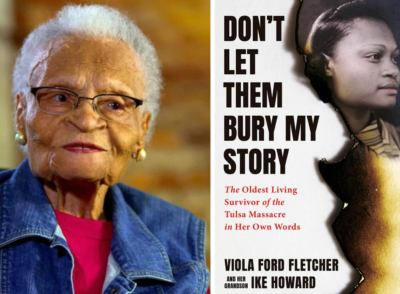 Tulsa Race Massacre Survivor Recalls Her Experience in New Memoir. By Angela Johnson / The Root
Tulsa Race Massacre Survivor Recalls Her Experience in New Memoir. By Angela Johnson / The Root
In Don’t Let Them Bury My Story, Viola Ford Fletcher writes about living through the horrific attack on the country’s most affluent Black community
At 109 years old, Viola Ford Fletcher has lived through many significant historical events, from the Great Depression to the January 6, 2021 attack on the United States Capital. But one event hits especially close to home for Fletcher. And now, she is ready to share her story with the world. In Fletcher’s new memoir, “Don’t Let Them Bury My Story,” which is set to release on August 15, she recalls her experience living through the 1921 Tulsa Race Massacre. Fletcher, who was seven years old when she watched her community go up in flames, says that although the event took place over 100 years ago, it left lasting wounds that may never heal. Read more
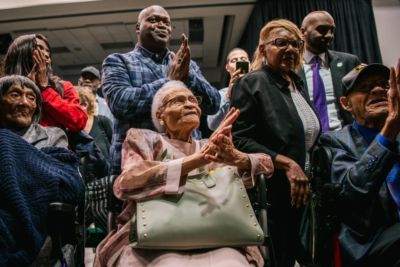 Lawsuit seeking reparations for Tulsa Race Massacre is dismissed. By Dennis Romero / NBC News
Lawsuit seeking reparations for Tulsa Race Massacre is dismissed. By Dennis Romero / NBC News
From left, Tulsa Race Massacre survivors Lessie Benningfield Randle, Viola Fletcher, and Hughes Van Ellis in June 2021.Brandon Bell / Getty Images/FILE
A lawsuit seeking reparations and rebuilding to address historical damage done by the 1921 Tulsa Race Massacre has been dismissed. The case, filed on behalf of the last three survivors of the assault by a white mob that killed an estimated 300 Black Americans in a community often called “the Black Wall Street” of its day, was dismissed by an Oklahoma judge Friday, according to its record. Judge Caroline Wall said in her decision that she agreed with defendants, parties that include the state and the city of Tulsa, who moved multiple times to dismiss. Wall dismissed the suit with prejudice, meaning it cannot be refiled in state court. Read more
Related: Outrage as Republican says 1921 Tulsa massacre not motivated by race. By Adam Gabbatt / The Guardian
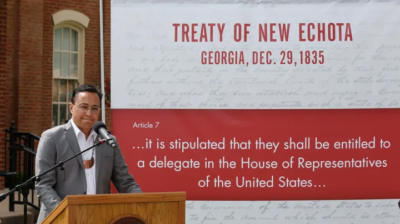 Legacy Of The Trail Of Tears Complicating Bid For Cherokee Representation In House. By Jonathan Nicholson / HuffPost
Legacy Of The Trail Of Tears Complicating Bid For Cherokee Representation In House. By Jonathan Nicholson / HuffPost
Cherokee Nation Principal Chief Chuck Hoskin Jr. at the announcement in August 2019 that the tribe planned to ask Congress to seat a non-voting Cherokee delegate, as called for in a 19th century treaty. via AP
There is clear sympathy on Capitol Hill for giving the Cherokees a nonvoting delegate in the House similar to delegates from U.S. territories and other jurisdictions, but lawmakers have little interest in negotiating the disagreements of the different Cherokee tribes. There are not one, not two, but three different bands of Cherokees with legally justifiable claims to having a delegate. And two of them say all three should be granted delegates or none should get one. Read more
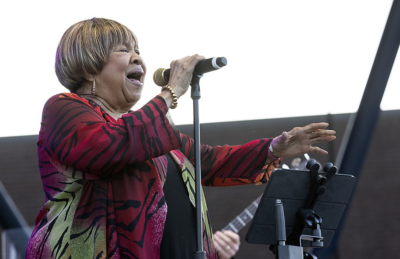 Black Music Sunday: Celebrating Mavis Staples on her 84th birthday. By Denise Oliver Velez / Daily Kos
Black Music Sunday: Celebrating Mavis Staples on her 84th birthday. By Denise Oliver Velez / Daily Kos
Singer Mavis Staples performs on June 2 in Charlotte, North Carolina.
At a time when once again, our civil and human rights are under concerted attack, we can always turn to our elder statespersons and artists to lift us up and give us inspiration as we organize and fight back. As we do so, we should also remember to celebrate them with our thanks and gratitude for the gifts they’ve given us over the years. With that in mind, our sister Mavis Staples turns 84 on Monday, so let us come together to celebrate her life, her music, her courage, and her faith in humanity. Read and listen here
 Aretha Franklin’s sons are going to court over her estate. Here’s what to know. By Daniel Arkin / NBC News
Aretha Franklin’s sons are going to court over her estate. Here’s what to know. By Daniel Arkin / NBC News
The soul superstar died nearly five years ago, but her last wishes remain the subject of a knotty legal fight. Aretha Franklin performs at Cathedral of St. John the Divine in New York City, on Nov. 7, 2017.
Five years after Franklin’s death at her home in suburban Detroit, her last wishes remain an open question and the subject of intense debate. The battle over the singer’s estate is now going to trial in probate court, with proceedings set to kick off Monday. The singer did not leave behind formal, typewritten instructions for her money and property. Eight months after her death, however, handwritten wills were found hidden in her home — including one inside a spiral notebook crammed under sofa cushions. Read more
 The Power Of HBCU Choirs. By Mary Gasman / Forbes
The Power Of HBCU Choirs. By Mary Gasman / Forbes
Baltimore’s Morgan State University choir (Photo By Chris Maddaloni/Roll Call/Getty Images)
A couple weeks ago, I had the opportunity to see the Morgan State University Choir perform with the Philadelphia Symphony at the Mann Center in Philadelphia, PA. As I sat in awe of the vocal abilities and passion demonstrated by the choir, I was reminded of the power of choirs at Historically Black Colleges and Universities (HBCUs), and of the contributions that HBCUs make to classical music and other types — contributions that often goes unnoticed. Read more
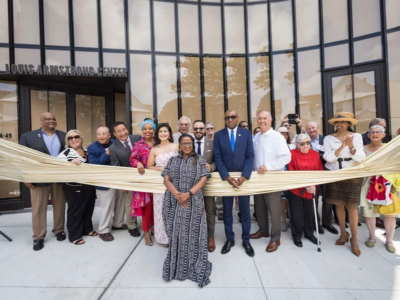 At Queens’ new Louis Armstrong Center, an archive comes home. By Nate Chinen / NPR
At Queens’ new Louis Armstrong Center, an archive comes home. By Nate Chinen / NPR
Regina Bain, executive director of the Louis Armstrong House Museum, leads a ribbon-cutting for the brand-new Louis Armstrong Center on June 29 in Queens, New York. Bowery Image Group/Andrew Kelly for Louis Armstrong House Museum
The Louis Armstrong Archive, the world’s largest for any single jazz musician, was established at Queens College in 1991. A dozen years later, the brick-faced home, already a registered landmark, opened to the public as the Louis Armstrong House Museum — a lovingly tended time capsule, and a humble but hallowed site of pilgrimage for fans from around the world. Read more
Sports
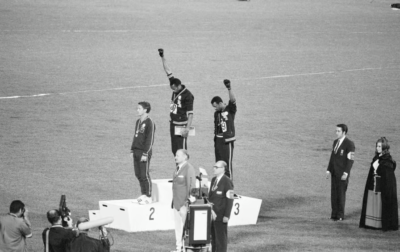 1968 Olympian Dr. John Carlos on the Legacy of the Black Athletic Revolt. By Dave Zirin / The Nation Podcast
1968 Olympian Dr. John Carlos on the Legacy of the Black Athletic Revolt. By Dave Zirin / The Nation Podcast
Tommie Smith and John Carlos, gold and bronze medalists in the 200-meter run at the 1968 Olympic Games, engage in a victory stand protest against unfair treatment of blacks in the United States. (Bettman / Getty Images)
The year 1968 was a time of rebellion across the US and the wider world. Tremendous demonstrations and rebellions shook American cities in opposition to the Vietnam War, the assassination of Martin Luther King Jr., and the arrest of Black Panther Party cofounder, Huey P. Newton. Amid this tumult, two athletes, John Carlos, and Tommie Smith, captured the spirit of the times by raising their fists at the 1968 Mexico City Olympics after placing first and third in the 200-meter dash. 45 years later, Dr. John Carlos is still with us—but many of his contemporaries have passed on. Dr. John Carlos joins Edge of Sports for a look back on the lives of Jimmy Hines, Ralph Boston, Herb Douglas, Harry Belafonte, Tina Turner, and Jim Brown. Read more and listen here
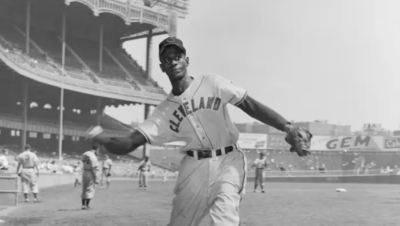 Satchel Paige’s MLB debut 75 years ago changed baseball forever. By Justice B. Hill / Andscape
Satchel Paige’s MLB debut 75 years ago changed baseball forever. By Justice B. Hill / Andscape
After breaking into the big leagues and winning the World Series, Paige pioneered a trail for Black ballplayers
In signing Paige, Veeck was getting the most celebrated figure in the history of “Black baseball.” Barred from the bigs because of his skin color, Paige had barnstormed the United States and Latin America for more than two decades, dazzling fans and baffling hitters with moves he named “be ball,” “wobbly ball,” “whipsy-dipsy-do ball” and “nothin’ ball.” He also had a high-octane fastball to overpower hitters. “The fabulous Satchel was to the Negro Leagues what Babe Ruth was, and is today, to baseball,” wrote Al Pritzker, sports editor of the Monrovia News-Post, in 1948. “A wrong has been partially corrected …” Read more
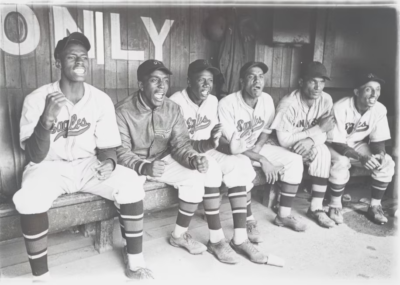 The rich history of baseball’s Negro Leagues arrives in theaters. By Scott Allen / Wash Post
The rich history of baseball’s Negro Leagues arrives in theaters. By Scott Allen / Wash Post
Newark Eagles players in the dugout in 1936. (Courtesy of Magnolia Pictures)
The rise, fall and enduring legacy of the Negro Leagues, none of which would have been possible without the entrepreneurial “Rube” Foster, are the focus of a new documentary titled “The League” by acclaimed director Sam Pollard. The movie, which opens nationwide this weekend and is executive produced by Ahmir “Questlove” Thompson, shines a light on the individuals who helped grow the Negro Leagues into a thriving economic force that stabilized Black communities amid the Great Migration. It will be available to stream digitally July 14. Read more
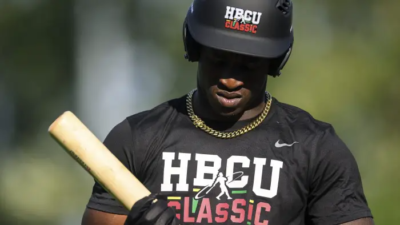 Ken Griffey Jr’s Swingman Classic is shouting out the good news of HBCU baseball. By William C. Rhoden / Andscape
Ken Griffey Jr’s Swingman Classic is shouting out the good news of HBCU baseball. By William C. Rhoden / Andscape
Griffey’s all-star game is a way of trying to level the playing field: ‘To be able to come out here and let these guys be seen on a national stage is important.’
On a warm, humid evening, 50 college players gathered at Husky Ballpark at the University of Washington for a warmup session, They were preparing for Friday’s inaugural Swingman Classic, an all-star game featuring handpicked players from 28 Historically Black Colleges and Universities. The event is the ambitious brainchild of former baseball superstar Ken Griffey Jr. and was co-sponsored by the Major League Baseball-Major League Baseball Players Association Youth Development Foundation. Read more
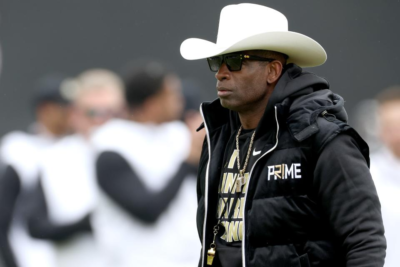 Nike confirms Deion Sanders relationship renewed after split years ago. By Brent Schrotenboer / USA Today
Nike confirms Deion Sanders relationship renewed after split years ago. By Brent Schrotenboer / USA Today
Deion Sanders and Nike are back together again after divorcing many years ago when their relationship turned sour and left him feeling unappreciated.
Nike confirmed the reunion Saturday in an email to USA TODAY Sports. “We welcome Deion Sanders back to the Nike family,” the company said in a statement. Sanders, now the head football coach at Colorado, also dropped a clue he was back with Nike in an Instagram post Friday. In the photo he posted, he wore a black shirt emblazoned with a Nike Swoosh next to his personal “Coach Prime” logo. On his lap in the photo was one of his old signature Nike shoes. Read more
Site Information
Articles appearing in the Digest are archived on our home page. And at the top of this page register your email to receive notification of new editions of Race Inquiry Digest.
Click here for earlier Digests. The site is searchable by name or topic. See “search” at the top of this page.
About Race Inquiry and Race Inquiry Digest. The Digest is published on Mondays and Thursdays.
Use the customized buttons below to share the Digest in an email, or post to your Facebook, Linkedin or Twitter accounts.